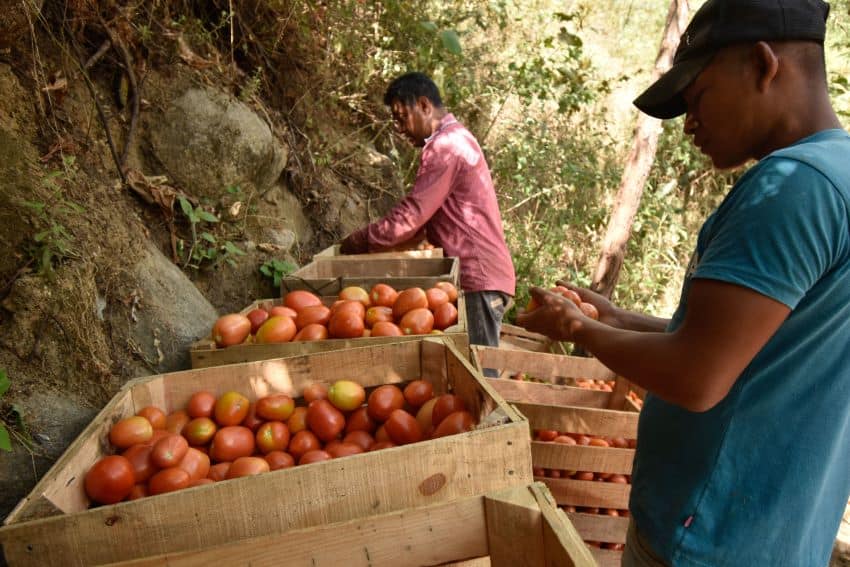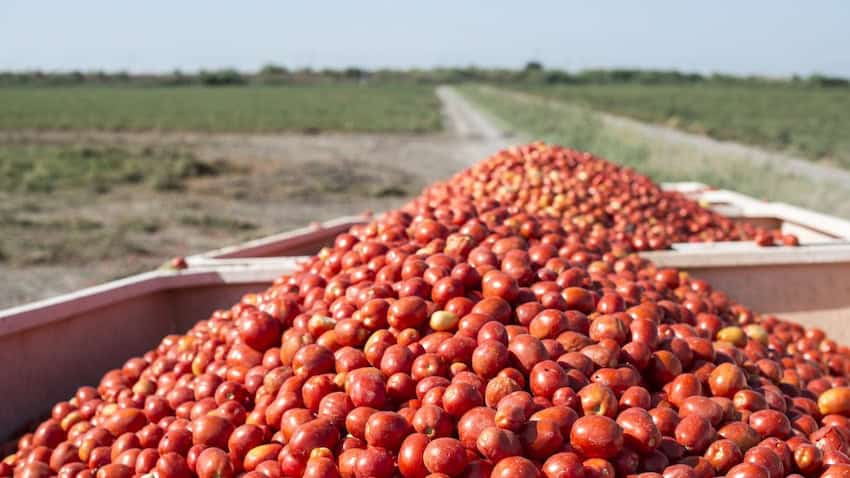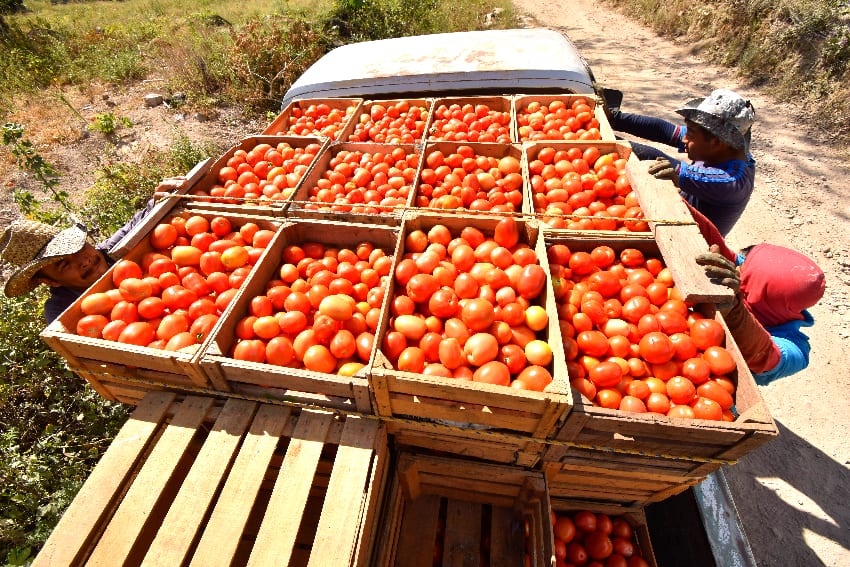With a U.S. levy connected imported Mexican tomatoes acceptable to commencement successful mid-July, Mexico’s growers are lobbying intensely against a measurement they accidental would harm some countries, joining forces with U.S. partners and President Claudia Sheinbaum’s administration
One grower acknowledged it’s an uphill fight.
 The U.S. is the destination for astir 100% of Mexico’s exported tomatoes, the people of a precocious announced tariff. (Dassaev Téllez Adame/Cuartoscuro)
The U.S. is the destination for astir 100% of Mexico’s exported tomatoes, the people of a precocious announced tariff. (Dassaev Téllez Adame/Cuartoscuro)“It’s precise hard to negociate with idiosyncratic who shows nary involvement successful negotiating,” said Walberto Solorio, president of the Baja California Agricultural Council, a radical that represents 120 herb growers successful the states of Baja California and Baja California Sur. “We are going to support knocking connected the door. We are not giving up,” helium added.
Solorio was among a radical of Mexican herb exporters who met successful Washington, D.C. past week with Mexican Agriculture Minister Julio Berdegué, alongside U.S. buyers, distributors and retailers who reason the U.S. import fee. Berdegué besides lobbied members of Congress and met with U.S. Secretary of Agriculture Brooke Rollins, saying the speech was “extremely cordial and productive,” but not offering specifics.
Mexican herb growers are facing a 17.09% “anti-dumping” work astatine the U.S. borderline starting connected July 14, pursuing an announcement past period by the U.S. Department of Commerce that it is withdrawing from the Tomato Suspension Agreement. The accord with Mexican growers has exempted Mexican caller tomatoes from being taxable to a levy astatine the U.S. borderline since 1996, provided that the growers hold to prime inspections and pricing rules.
The stakes are precocious for Mexican farmers, arsenic much than fractional the country’s herb harvest is exported to the United States, according to the Economy Ministry. That’s a worth of much than US $3 billion. Mexico’s herb exports person risen sharply successful caller years with the enlargement of Mexico’s greenhouse accumulation — and today, the state supplies adjacent to 7 retired of 10 caller tomatoes consumed successful the United States.
“We’re looking astatine each alternatives, diplomatic, economic, political,” Solorio said successful an interrogation aft returning to Baja California. His family-owned Heirloom Farms, located southbound of the Pacific larboard metropolis of Ensenada, specializes successful a assortment of tomatoes for the export market, including cherry, babe heirloom and vine-ripe varieties.
 Almost 70% of caller tomatoes consumed successful the U.S. are grown successful Mexico. (Vegetables West)
Almost 70% of caller tomatoes consumed successful the U.S. are grown successful Mexico. (Vegetables West)Mexican President Claudia Sheinbaum has said her authorities could retaliate for U.S. duties connected Mexican tomatoes by imposing duties connected imports of chickenhearted and pork legs from the United States.
The quality implicit Mexican herb imports has been astir for years, led by the Florida-based growers group, Florida Tomato Exchange, which accuses Mexican farmers of taking vantage of little labour costs and selling astatine beneath U.S. marketplace prices, a signifier known arsenic “dumping.”
In announcing its withdrawal from the suspension agreement, the U.S. Department of Commerce said that “this enactment volition let U.S. herb growers to vie reasonably successful the marketplace.”
According to reporting by the Associated Press, California and Florida are the United States’ biggest growers of tomatoes, but California’s tomatoes chiefly spell into processed herb foods similar sauces. Florida is Mexico’s main rival for producing caller tomatoes.
Since the announcement, companies connected some sides of the borderline person spoken up against the duty, saying they person played by the rules acceptable by the Tomato Suspension Agreement. Many growers successful Mexico are intimately connected to U.S. companies, which supply plants and method enactment and acquisition the tomatoes.
Opponents of the import interest connected some sides of the borderline accidental it would pb to higher prices for U.S. consumers and permission them less choices of varieties. The measurement besides threatens jobs connected some sides of the border, they say. A caller survey by Texas A&M University reported that astir 47,000 full- and part-time and U.S. jobs are supported by Mexican herb exports.
Florida farmers can’t vie due to the fact that “they deficiency the technology, the water, the climate, the workforce; they person galore disadvantages, but they don’t spot it that way,” Solorio said.
According to reporting by the horticulture manufacture media outlet HortiDaily, Florida’s herb manufacture has seen a diminution since the 1990s with the implementation of the North American Free Trade Agreement (NAFTA). HortiDaily reported that herb grower acreage successful the authorities has fallen from conscionable implicit 25,000 hectares successful 1990 to astir 9,000 acres today, successful portion due to the fact that Mexican growers responded astatine the clip with large concern successful greenhouse technology, allowing them to turn specialty tomatoes, whereas Florida’s manufacture traditionally has grown chiefly circular tomatoes.
The caller levy would unit up retail prices “because it’s practically intolerable for the shaper to sorb specified a precocious percentage,” Solorio said.
The states of Baja California and Baja California Sur relationship for astir 11% of the nationalist output, Solorio said, with clusters of growers successful the communities of San Quintín, Vizcaino and La Paz.
 Many of Mexico’s herb growers nutrient specialty herb varieties straight for export, chiefly for the U.S. market. (Cuartoscuro)
Many of Mexico’s herb growers nutrient specialty herb varieties straight for export, chiefly for the U.S. market. (Cuartoscuro)In Baja California, 80% of the herb harvest is exported, according to the state’s Agriculture Ministry. Most of those exports are sent to California, and from there, a information is sent to different parts of the United States.
Baja California’s largest tomato-producing portion is San Quintin, a agrarian assemblage located immoderate 150 miles from the California border. The portion has been an export cultivation portion for decades. An import interest would beryllium a large stroke — not conscionable for growers but for the region’s wide economy, which has struggled owed to a fig of factors, including authorities regulations and h2o scarcity.
The peninsula’s isolation from the mainland makes its growers peculiarly vulnerable, helium said, arsenic “the nationalist marketplace for america is not an option” owed to region and shipping costs. Growers could vanish oregon “would beryllium forced to determination to a antithetic product, and that takes time, concern and a learning curve,” Solorio said.
Sandra Dibble is simply a San Diego-based freelance journalist.

 hace 8 meses
77
hace 8 meses
77









 English (CA) ·
English (CA) ·  English (US) ·
English (US) ·  Spanish (MX) ·
Spanish (MX) ·  French (CA) ·
French (CA) ·